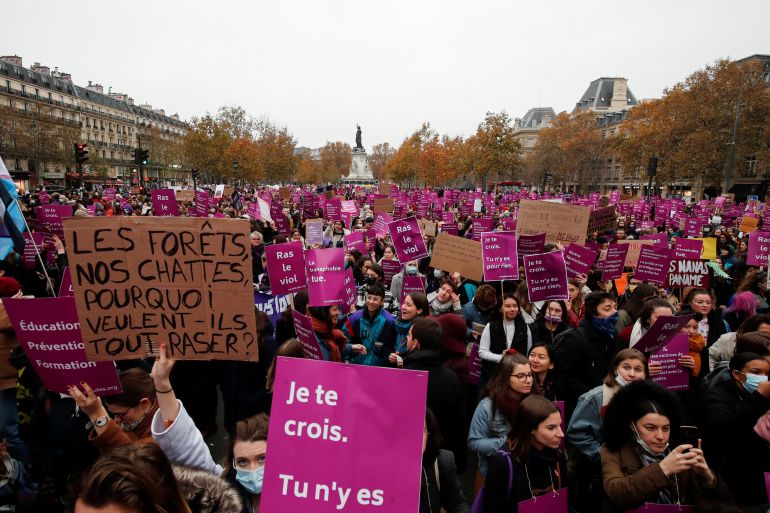France remains ‘very sexist’: Watchdog sounds alarm
The country’s equality council warns of high rates of sexual violence, says young generations worst affected.

Five years into the #MeToo movement, French society “remains very sexist in all of its spheres”, a government-created equality watchdog says in its annual report.
The High Council for Equality between Women and Men also sounded the alarm on high rates of sexual violence reported by women as it called on Monday for a national “emergency plan” to combat “the massive, violent and sometimes lethal consequences” of sexism.
Keep reading
list of 3 itemsLondon, Scotland head for showdown as gender debate rages
Women in science should be the norm, not the exception
In a survey commissioned by the council, one-third of women said they have been badgered by their partners into sexual acts they did not want.
About one in seven respondents said men had forced sex on them, and a similar number reported having been hit and shoved by their partners, the council said.
Sylvie Pierre-Brossolette, the council’s president, expressed particular concern about sexism among younger men who had “bathed in social media, digital [technology], pornography”.
She said sexism must be ”fought from the youngest of ages”.
The council will present its findings to French President Emmanuel Macron on Wednesday.
“Young people in particular are brought up digitally on these scenes of mundane violence, of relations between men and women that are completely of domination and dominated and that has impregnated society,” Pierre-Brossolette said, speaking to the broadcaster France Inter.
“Uprooting sexism is very hard,” she said.
The council found that at least 80 percent of women believe they are treated worse than men on account of their sex.
It said the number and severity of these incidents were rising in the public, professional, private and digital spheres. It saw a paradox in public opinion, which recognised the existence of sexism but did not reject it in practice.
Among men aged 25 to 34, almost a quarter said they sometimes feel compelled to use force to be respected.
Across all age groups, 40 percent of men thought it was normal for women to stop working to look after children.
Progress in some areas
The council proposed a 10-point plan of action, which includes tougher regulation of online content.
Other suggestions included making training against sexism obligatory in workplaces and banning adverts that suggest some children’s toys are for boys and others for girls.
While the findings seemed grim, France has made significant progress in some areas.
Prime Minister Elisabeth Borne is only its second woman to hold the post, and parliament’s lower house also installed its first female president, Yael Braun-Pivet, in June.
Macron’s government has increased police resources against domestic violence and offered free birth control to all women up to age 25.
Politicians are also working to constitutionally guarantee France’s abortion rights with a bill intended to prevent any of the rollbacks in reproductive rights seen elsewhere, including in the United States.
Still, the equality council described the overall situation for women in France as “alarming”.
“Sexism is not retreating in France,” the council’s report said. “On the contrary, some of its most violent manifestations are getting worse, and the young generations are the most affected.”